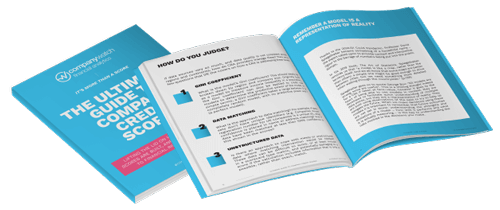Why You Should Check Your Own Business Credit Score

It’s vital to know your customer, but it’s just as important to know yourself. A company credit check is a great way to vet potential business partners, but it can also provide valuable insight into your own financial situation.
Running a credit check on your own company may sound like a strange idea, but it’s something every business should consider.
In this blog, we’ll take a look at why you should check your own business credit score, what the results can tell you, and why you should think carefully about your needs before choosing your next credit reference agency (CRA).
Reasons to check your business credit score
-
Early detection - Business credit reports can sometimes contain errors that could have a negative impact on your score. Regularly checking your own score allows you to identify and correct any mistakes early on, preventing potential financial repercussions down the line.
-
Funding and financing - Your business credit score reflects your company's financial health and creditworthiness. A good business credit score will increase your chances of securing loans or attracting investors, while a poor score may cause funding difficulties or unfavourable terms. Securing financing could be crucial for your business growth!
-
Vendor relationships - Some suppliers and vendors may review your business credit score and business credit history before deciding to extend payment terms. Maintaining a healthy credit score can help you build stronger relationships with suppliers, giving you more flexibility in managing your cash flow.
-
Risk avoidance - Spotting any weaknesses early on enables you to take action to improve your score. Regularly checking your own business credit score will alert you to any sudden drops in your score. This could be a sign of financial distress, helping you identify and address potential issues before they escalate.
Don’t settle for a basic credit score
Checking a business credit score is quite straightforward. Most credit reference agencies will simply ask you for the name of the company, and then come back to you with a credit score. This process is the same whether you’re checking your own credit score or that of another business.
This is quick and easy, but the result may not be all that useful. These credit ratings often take the form of a single number, or a red, amber, green traffic light rating. They come with little or no explanatory information, giving you no real insight into the company.
Even if you ask for more detail, the credit reference agency may be unable to provide it. Scores are often machine-generated through complex algorithms, making them just as impenetrable to the credit reference agency as they are to you.
This is of little use if you’re trying to gauge your own company’s financial stability. The whole point of running a credit check on yourself is to flag up areas of weakness. If you don’t know how the score was calculated, you don’t know what you can do to improve it.
A more in-depth rating is needed, and this is where we can help!
◼️ Read about the dangers of black box scores
A business credit score you can trust
We pride ourselves on digging deeper than other credit reference agencies. We don’t just check your business credit score. We look at every aspect of your business and present our findings in a detailed and transparent way. This allows you to zero in on areas for improvement, and make the necessary changes to improve.
Our scoring system is a world away from a traditional B2B credit score. While most CRAs only look at the current state of your finances, we compare your business to similar companies that have failed in the past. This lets us predict the likelihood of failure in the next five years, which we express as a number known as the H-Score®. This is a value from 1-100, with a score of 25 or less considered high risk.
The H-Score® is the perfect way to gauge your company’s overall financial stability, but it’s not our only metric. You may be concerned about a particular area of your business and wish to investigate further. This would be impossible with a basic credit score, but we’re happy to oblige:
- Probability of Distress (PoD®) combines your H-Score® with rates of distress in your industry and current economic factors. It then uses this information to calculate the probability of a business failure in the next one to three years.
- TextScore® uses machine learning to analyse the language in your financial reports. It searches for patterns of words that have been associated with company failures in the past and uses this to calculate the probability of your company experiencing financial distress.
- Credit Limit uses H-Score®, PoD®, and cash flow measures to calculate the amount of credit you can safely extend to a company. Running this check on yourself will give you a good idea of how risky you seem to potential partners.
Plenty more where that came from
We’ve focused on scores in this blog, but these are just one of the services we offer. Our customers have access to a wide range of tools designed to give you the edge in financial risk management.
Whether it's modelling the impacts of financial shocks or finding hidden company directors, we’ve got everything you need to spot risks in advance.


